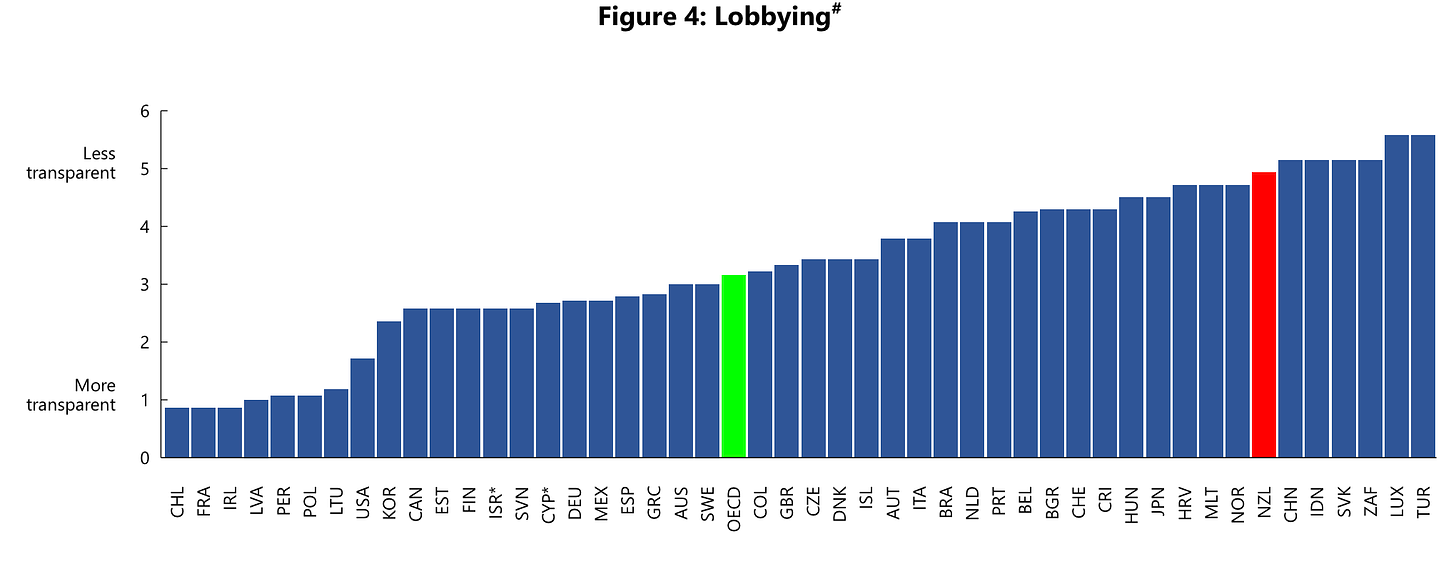According to an OECD report released today, New Zealand needs to tame its corporate lobbying industry. The Paris-based Organisation for Economic Cooperation and Development has ranked New Zealand as the fourth-worst country among its 38 members when it comes to regulating vested interests that try to influence policymaking.
The OCED report for this country, Product Market Regulation indicators: How does New Zealand compare?, says that New Zealand is one of the few advanced economies that still doesn’t “have adequate rules that ensure transparency and accountability in the interactions between public officials and interest groups”. They warn that this absence threatens to produce an “unlevel playing field” in which big businesses can dominate and monopolise New Zealand industries, reducing productivity.
The report evaluates all the regulations in economies such as New Zealand to highlight where regulation, or a lack of it, leads to reduced economic competition. The OECD performs this process every five years, using about 1000 questions relating to each country’s regulatory framework. Overall, the quality of New Zealand’s regulations is deemed to be very close to the average in the OECD—the country ranks 20 out of the 38 organisation members.
Regarding lobbying regulations, the OECD measures each country on a scale between 0 to 6, in which 0 means “more transparent” and 6 means “less transparent”. Countries at the top of the scale, like France and Ireland, have excellent lobbying scores – both on 0.86 out of 6, and even the US is near the top, with a very good score of 1.71. New Zealand is at the other end with a score of 4.93 out of 6. The only OECD countries faring worse are Slovakia (5.14), Luxemburg (5.57) and Turkey (5.57).
You can see how New Zealand fares in the regulation of lobbying in the chart below, taken from the report - the red bar is for New Zealand, the green bar is the OECD average:
The organisation suggests that New Zealand could improve its regulation of lobbying with the following changes:
Introduce a mandatory registry for all interest groups
Require public officials to disclose their agendas and the identity of permanent advisory board members they consult during the regulatory process
Impose a cooling-off period for public officials leaving office
Ensure that the conflict of interest rules apply to all policymakers
Another OECD warning about New Zealand lobbying in May
Today’s embarrassing findings on New Zealand’s lack of lobbying regulations come after the OECD also published a report in May on the state of the economy, which also drew attention to this country being an outlier – see: OECD: New Zealand Economic Snapshot
This report said: “New Zealand is not close to the frontier of international best practice in terms of regulating lobbying and/or cooling off periods between the public and the private sector, which does not foster a level playing field”. It pointed out that although “Corruption is low in New Zealand… there are fewer restrictions on moving from politics into lobbying roles than in other countries”. It concluded with the recommendation that New Zealand “Introduce tighter standards against lobbying and conflicts of interest.”
Commenting on this at the time, economist Cameron Bagrie wrote in BusinessDesk that the OECD’s observations of the dominance of vested interests in New Zealand were “hard-hitting”, and he lamented that they weren’t getting more coverage in the media. In fixing these issues, Bagrie pondered whether the Government would be “a tiger or tabby” in confronting oligopolistic firms.
Bagrie suggests that big corporates have become too powerful, and they have influential advocates such as “Business New Zealand,” which the economist suggests could be renamed “Big or Major Company Business NZ” since it is said to favour the big operators in industries including groceries, financial services, dairy, building supplies, airlines, ports, and petrol and electricity retail.
As a result, the OECD and Bagrie say that these industries are making mega-profits. It also negatively impacts the public and the economy: “Insufficient competition is an important factor underpinning low productivity. Limited competition dilutes pressures to innovate, become more efficient, and provide better services and cheaper prices to consumers. The status quo means consumers pay more.”
Reduced public confidence in politics and business
The OECD has also conducted survey research about perceptions of vested interests and the political process in New Zealand. Last year they published their report on this, Drivers of Trust in Public Institutions in New Zealand, which showed that only “half of New Zealanders are confident that [state] institutions would use power or resources ethically” and that a third of New Zealanders “reported cynical expectations about government institutions acting in the best interest of all”.
The OECD report recommended various measures to turn around public perceptions that vested interests dominate the policymaking process. They concluded, “to improve perceptions of political integrity and shield public policies from undue influence, New Zealand could reopen discussion on developing lobbying regulations, as well as tighten political finance laws by defining clearer targets and broadening the scope of transparency requirements and bans.”
Will the National-led Government listen to the OECD?
The last Labour Government was bedevilled by a number of lobbying scandals, which eventually forced Labour to direct the Ministry of Justice to start the Political Lobbying Project, which carried out research on what might be done to tame lobbyists in New Zealand.
It’s still unclear whether the new administration will let the Ministry of Justice finish their work – especially the proposals they have been working on that are quite similar to what the OECD is recommending. However, there are signs that the new Government is also quite close to lobbyists, and plenty of decisions have already been made in the sectors of mining, fisheries, oil exploration, alcohol and tobacco that suggest lobbyists are incredibly influential on Cabinet Ministers.
Furthermore, many observers and critics have noted that the Fast Track Approvals Bill is designed to make professional lobbying even more central to the decision-making processes on infrastructure.
It’s unlikely that the current politicians in power are listening to concerns about lobbying or are willing to act to implement the necessary reforms. This was also apparent today when the Minister for Regulation and Act Party leader David Seymour published a press release about the OECD’s latest report on New Zealand.
Seymour entirely ignored the report’s evaluations of lobbying and the need for reform and instead argued that the report showed why New Zealand needs more deregulation and his “war on red tape” – see: OECD report shows New Zealand is a red tape state
Seymour’s answer to all these problems, he says, is his new Ministry for Regulation. But there’s one more OECD report that he and his ministry should be reading. The organisation recently published its Recommendation of the Council on OECD Legal Instruments Transparency and Integrity in Lobbying and Influence. And once again, the key message is not that lobbyists and businesses need the government red tape cut, but the opposite – that the public interest, including solid economies, relies on taming vested interests.
Dr Bryce Edwards
Political Analyst in Residence, Director of the Democracy Project, School of Government, Victoria University of Wellington
This analysis is supplied exclusively to Democracy Project Substack subscribers and the New Zealand Herald.
Key Sources
Cameron Bagrie (BusinessDesk): The govt's productivity issue approach: tiger or tabby (paywalled)
OECD: Product Market Regulation (PMR) indicators: How does New Zealand compare?
OECD: New Zealand Economic Snapshot
OECD: Drivers of Trust in Public Institutions in New Zealand
David Seymour: OECD report shows New Zealand is a red tape state






Well on the way to match the late-departed British Conservative government for cronyism.
Will the National-led Government listen to the OECD?
You are hilarious Bryce ;)